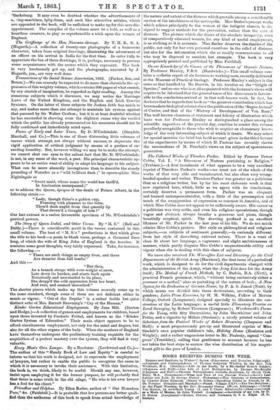(Trubner.)—A first instalment of what appears to be a very
excellent reprint of Theodore Parker's works—we trust not of the whole of the works of that very able and warmhearted, but also often very wrong- headed speaker and writer. Theodore Parker was greater as a politician than as a religious writer, but by far his most elaborate work is that now reprinted here, which, little as we agree with its conclusions, certainly deserves a permanent form. Parker was an eloquent and learned antisupernaturalist, with a little of the presumption and much of the exaggeration of expression so common in America, and of which Miss Cobbe does not appear to be sufficiently aware. His career as a politician was very noble, and even his religious speculations, though vague and abstract, always breathe a generous and pious, though boastfully sceptical, spirit. The drawing prefixed is an excellent likeness of Mr. Parker in the last year of his life. We do not much admire Miss Cobbe's preface. Her style on philosophical and religions subjects,—on subjects of sentiment generally,—is curiously different from her style of describing external nature. There is a want of close fit about her language, a vagueness and slight ambitiousness of manner, which partly disguise Miss Cobbe's unquestionable ability and vigour when she is dealing with this class of subjects.
We have also received The War-office List and Directory for the Civil Departments of the British Army (Harrison), the first issue of a periodical
work, which is designed to do for the civil departments charged with
the administration of the Army, what the Army List does for the Army itself; The Method of French Methods, by C. Badois, B.A. (Nutt), a
practical French grammar, which, "without being exclusively either a
grammar or a method," aims at partaking of the nature of both ; A New System for the Declension of German Nouns, by P. A. S. Junod (Nutt), by
which nouns are divided into three declensions, according to their
genders; Latin Prose Exercises, by H. M. Wilkins, Fellow of Merton College, Oxford (Longmans), designed specially to illustrate the con-
struction of the Latin language ; a useful little Elementary Treatise on Land Surveying, by Robert Thornton (Longmans) ; Wordsworth's Poems for the Young, with fifty illustrations, by John Macwhirter and John Pettie, and a vignette by Millais (Strahan); a nicely printed volume of Selections from the Poetical Works of Robert Browning (Chapman and Hall) ; a most preposterously got-up and illustrated reprint of Miss Sinclair's once popular children's tale, Holiday House (Honlston and Wright); and a rather ungracious letter to Mr. Peabody, signed " Con- gress" (Tresidder), calling that gentleman to account because he has not taken the best steps to ensure the wise distribution of his magni- ficent gift to the poor of London.


























































 Previous page
Previous page